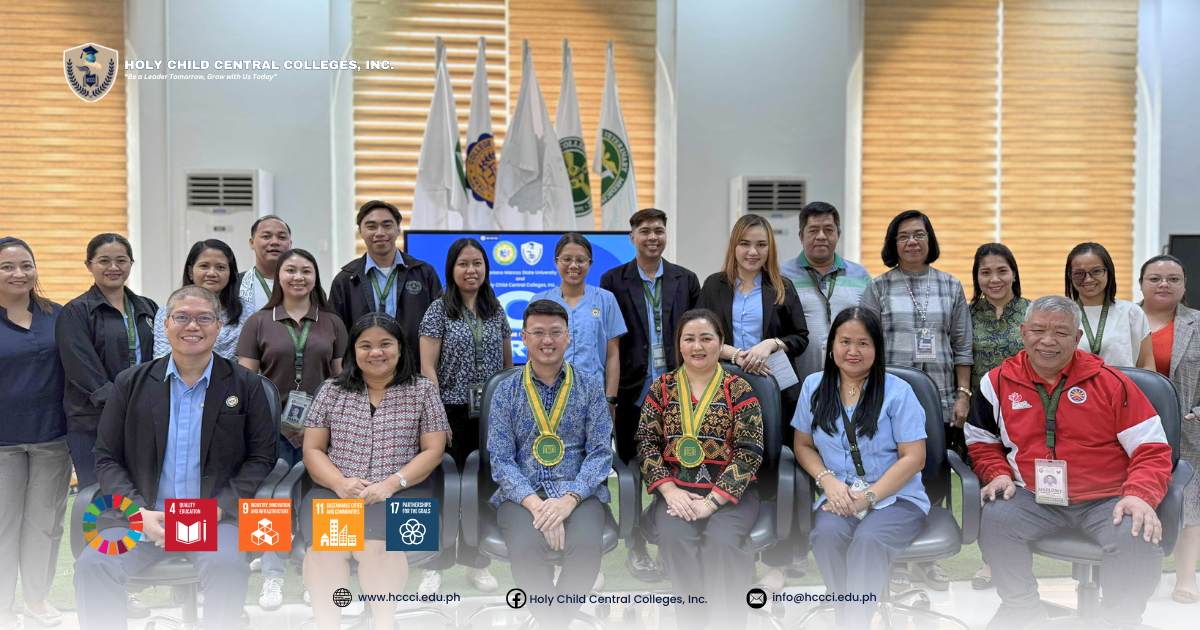𝐇𝐨𝐥𝐲 𝐂𝐡𝐢𝐥𝐝 𝐂𝐞𝐧𝐭𝐫𝐚𝐥 𝐂𝐨𝐥𝐥𝐞𝐠𝐞𝐬, 𝐈𝐧𝐜. 𝐒𝐡𝐚𝐫𝐞𝐬 𝐈𝐭𝐬 𝐉𝐨𝐮𝐫𝐧𝐞𝐲 𝐢𝐧 𝐏𝐢𝐨𝐧𝐞𝐞𝐫𝐢𝐧𝐠 𝐂𝐎𝐈𝐋 𝐃𝐮𝐫𝐢𝐧𝐠 𝐚 𝐂𝐨𝐮𝐫𝐭𝐞𝐬𝐲 𝐕𝐢𝐬𝐢𝐭 𝐭𝐨 𝐌𝐚𝐫𝐢𝐚𝐧𝐨 𝐌𝐚𝐫𝐜𝐨𝐬 𝐒𝐭𝐚𝐭𝐞 𝐔𝐧𝐢𝐯𝐞𝐫𝐬𝐢𝐭𝐲
Holy Child Central Colleges, Inc. (HCCCI) was warmly welcomed by Mariano Marcos State University (MMSU) during the COIL Interface, held on August 27, 2025, at the MMSU CFL International Hall. Far beyond a simple exchange, this gathering became a platform to deepen understanding, share HCCCI’s best practices in Collaborative Online International Learning (COIL), listen to MMSU’s vision for its own COIL initiatives, and explore the potential for a meaningful and sustainable partnership centered on COIL and other forms of student virtual exchanges.
For HCCCI, since the establishment of its iLab grant, COIL has become a distinctive niche in its academic journey. Over the past year, the institution has steadily integrated COIL across its programs as a strategy for internationalization at home, enabling students to collaborate and engage with peers from different parts of the world without leaving the Philippines. During the event, Dr. Erwin M. Faller, Academic Director of HCCCI, provided an overview of this pioneering approach, noting that while HCCCI has made strides, each interaction continues to be a moment of learning and growth. He emphasized that COIL does not only enrich academic learning, but also strengthens community building, sustainability, and HCCCI’s vision of forming globally aware yet locally grounded graduates. Each partnership adds value, and together they bolster HCCCI’s expanding global presence.
In the synthesis and ways forward, Executive Vice President Vanessa Marie L. Antiquin, MMEM, expressed optimism for the future of this partnership. She noted that while HCCCI has already engaged in COIL projects with international universities, it is deeply encouraging to now begin cultivating local collaborations that can later expand globally. She emphasized the institution’s humble yet strong commitment to advancing the United Nations Sustainable Development Goals (SDGs), particularly in promoting quality education (SDG 4), strong partnerships (SDG 17), sustainable innovation (SDG 9), and inclusive communities (SDG 11). She also highlighted how MMSU’s strong academic foundation and global perspective complement HCCCI’s aspirations, creating fertile ground for co-created initiatives that benefit students, faculty, and surrounding communities.
HCCCI extends its sincere appreciation to Dr. Virgilio Julius P. Manzano, Jr., President of MMSU, for his inspirational message and for affirming MMSU’s commitment to global collaboration. The institution also warmly thanks Dr. Mee Jay A. Domingo, Vice President for Planning and Strategic Foresight, for his gracious welcome remarks, and Dr. Mark Joseph D. Pastor, Chief of International Programs, for presenting the rationale of the COIL Interface and setting the stage for meaningful dialogue.
Deep gratitude is likewise extended to Prof. Luvee Hazel C. Aquino, Director for Curriculum Development and Innovative Learning of HCCCI, for contributing valuable insights during the synthesis and ways forward, underscoring the importance of innovative learning and co-creation of programs that advance both student success and community sustainability. Equally, HCCCI is thankful to Ms. Krismari Sharmaine Yapo-Agbigay, who moderated the session with skill and warmth, and to the entire MMSU community whose hospitality and thoughtful participation enriched the event.
This interface is more than a ceremonial gathering—it marks the beginning of a promising journey. With humility and excitement, HCCCI looks forward to nurturing this budding partnership with MMSU through COIL. Together, both institutions envision creating transformative and sustainable learning experiences that empower students to contribute meaningfully to their local communities while embracing their role as part of the wider global community.
